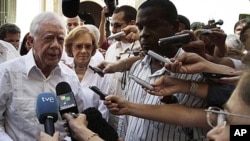Former U.S. President Jimmy Carter on Wednesday wrapped up a three-day, private visit to Cuba, his second to the communist-led island since 2002, the year he was awarded the Nobel Peace Prize. The United States and Cuba do not have formal diplomatic relations, only interests sections that are technically part of the Swiss embassies in each other's capitals.
Throughout his visit, former President Jimmy Carter made an effort to diminish expectations about the possible release of jailed American Alan Gross.
Gross, shown in this photo with his wife, was recently sentenced to 15 years in jail for bringing communications equipment into Cuba. He maintains he was just trying to improve Internet access for the island's small Jewish community.
Mr. Carter told reporters before leaving Havana he met with Gross at an undisclosed location and repeated his belief that Gross is innocent. "He's been sentenced to a long term in prison and my hope is that he might also soon be given his own freedom. So there are many things that can be done between our two countries to improve relationships and let us have normal relations in every possible way," he said.
In Washington, a State Department spokesman (Mark Toner) told reporters the U.S. is "disappointed" that Cuba did not release Gross. Just last August, Mr. Carter secured the release of an American jailed in North Korea.
The former president also said he did not try to win Gross's release by offering to facilitate an exchange for the so-called Cuban Five - five men convicted of espionage in the U.S. in 2001. Cuba says they were protecting the island from alleged terrorists. Mr. Carter says the two cases are not related, but he added:
"I think that Alan Gross should be released because he is innocent of any serious crime and I believe that the Cuban Five should be released because they have served 12 years in prison now, and the original circumstances of their trial were considered to be doubtful," he said.
During his three-day visit, Mr. Carter met with Cuban President Raul Castro and his brother, former President Fidel Castro.
Mr. Carter also met with senior government officials and religious leaders, as well as 12 dissidents recently released from prison by the Cuban government. He said Cuba must begin to guarantee:
"A complete freedom for all Cuban people for speech and assembly, for travel, that all the internationally adopted standards of human rights will be enforced in Cuba," he said.
Mr. Carter is the only former U.S. president to visit the communist-led island since the 1959 revolution that brought Fidel Castro to power. Mr. Carter's foundation, the Carter Center, says the invitation to visit Cuba came from the government in Havana.




